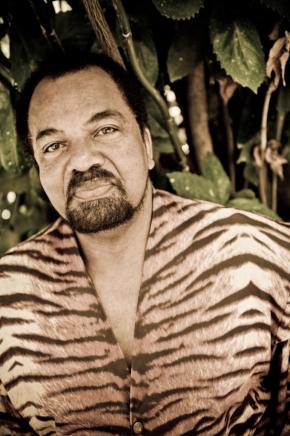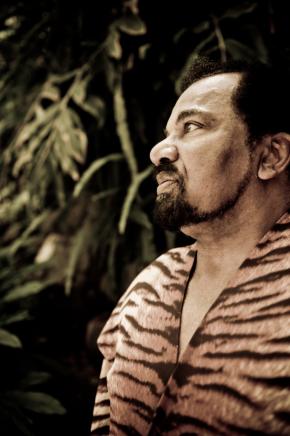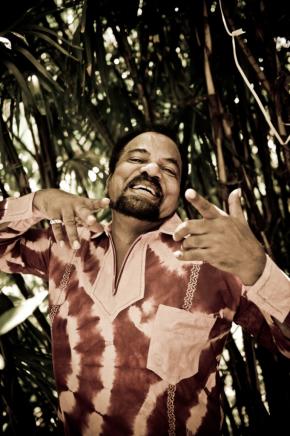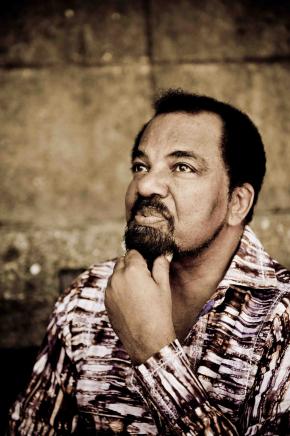Bonga “I help to place Angola in the world”
 © Rita Carmo / LusafricaHe makes Angolan music for 40 years, has nearly 500 musical themes recorded and “many miles on the road”. Bonga, whose voice identifies with Angola, has always been attentive to the reality of his country, preserving and disseminating the Semba musical style. He is keen to highlight: “Just like Brazil has Samba and America has Rock, Angola has Semba. It is the music I heard in the cradle”. His musical path was marked by his respect to “origin, tradition and pulse of the Semba”, taking it and spreading it around the world.
© Rita Carmo / LusafricaHe makes Angolan music for 40 years, has nearly 500 musical themes recorded and “many miles on the road”. Bonga, whose voice identifies with Angola, has always been attentive to the reality of his country, preserving and disseminating the Semba musical style. He is keen to highlight: “Just like Brazil has Samba and America has Rock, Angola has Semba. It is the music I heard in the cradle”. His musical path was marked by his respect to “origin, tradition and pulse of the Semba”, taking it and spreading it around the world.
Bonga does not stop and has a new album, “HORA KOTA”, which appeals to the deeper African identity, valuing ancestral teachings and principles, in listening to the stories of the elderly, which can contribute with some clarity in a confused and conflicted world like the one we live in.
Today, the Angolan singer and composer Barcelô de Carvalho, Bonga, feels compensated for all his effort, at first he was confined only to play typical percussion instruments, since he was rejected and prevented from singing because of his husky voice. “Who would say that I, with my husky voice, would be a singer? – he wonders.
In a conversation, in Lisbon, in his provocative and expansive way, Bonga explains some aspects of his life. To begin with he says he has been privileged by the fact of being born “in a home with content” (with education), and not having been “a child who runs around and insults the older”.
Education at home, at school and on the street, between neighbors, taught him to be Angolan “and that it’s not only to eat Moamba (typical Angolan dish) and wear an African robe, it is mainly to speak the Kimbundu language, to know the sayings and certain rituals of great philosophical potential. That’s where I got my sources. I am an artist because of that”.
Life in the musseque (poor neighborhood) where he grew up, promoted that identity: “it lacked the ham, the buns, wheat flour, but there were cassava, palm oil, fish and dried meat and all the fruit I sing in the songs - mangoes, cashews, the tambarinos (Angolan fruits). This was very important because it gave us a certain physical strength. When I came to Portugal (as an athlete in the 60s), I beat all Angolan records in athletics. In the first interview, at the airport, I was asked if the strength came from ovomaltines (chocolate drink) … No, no, no, it came from the cassava!” (Laughs).
In his childhood, music was already a vehicle of resistance and maintenance of the Angolan identity. Bonga refers the discrimination and repression of the colonial regime, which were aggravated with the outbreak of the war against colonial occupation. The demand and discomfort of people appeared in the music that was made at the time. “We have created folk groups that served to preserve the identity, but also the calling for responsibility and mobilization. It was necessary to do something. In school we learned the Portuguese rivers; in the Angolan station there were no Angolan music. It was necessary to fight the Portuguese colonists, imposing European rules, but also against the assimilated black, which imitated the boss”.
His fight was mainly focused on the issue of colonized mentalities: “The Portuguese arrived in Angola with the holy faith, the cross and dominated who dominated. With gunpowder, could eliminate some, there was slavery to sell others. Then, assimilated a few who remained in the systematic imitation of the white man. We were against that”.
Life in Europe
He left Angola to come to Portugal in 1966, with those sources and teachings, and after he joined groups. He also brought Athletics to Portugal and in contact with groups and Angolan artists living there, like the Duo Ouro Negro, Rui Mingas, Vum Vum, he would also begin to sing. He escapes from Portugal when André Mingas, “a great man who we have just lost”, arrived from Angola with a political message that said: “Your name is already in the list of upcoming prisoners”. In 24 hours I ran to the Netherlands. Bonga was on the list of the Portuguese political police because, in his travels as a sportsman, he took the opportunity to disseminate discrimination and repression in Angola and to make aware the Angolan diaspora.
In the Netherlands, they soon noticed that he was a great athlete, because in his first race he was second just behind the Dutch champion. In the next day, a newspaper reported that the unknown athlete until then was Barcelô de Carvalho, Portuguese champion in the 400 meters. It was also in the Netherlands where he recorded his first album, “Angola 1972”, in which he expresses his more politically engaged side.
 © Rita Carmo / Lusafrica After spending some time in Germany and Belgium, he settled in France, taken as a city “where there was more organization and where everything happened”. Nevertheless, he felt “a huge culture shock in a closed and prejudiced Europe of 70s”. Bonga states that at that time, his performances were announced “with the usual ignorance and rated in the bottom. They would announce, there will be an animation with an African, they wouldn’t even say my name, and I went to the stage. I’ve always been a bold person, I started singing and people liked it”.
© Rita Carmo / Lusafrica After spending some time in Germany and Belgium, he settled in France, taken as a city “where there was more organization and where everything happened”. Nevertheless, he felt “a huge culture shock in a closed and prejudiced Europe of 70s”. Bonga states that at that time, his performances were announced “with the usual ignorance and rated in the bottom. They would announce, there will be an animation with an African, they wouldn’t even say my name, and I went to the stage. I’ve always been a bold person, I started singing and people liked it”.
The internationalization of his career starts in response to successive trips invitations. He recalls: “I was much solicited. Not by my statements or by my political engagement, but mainly because of my voice. I could not believe, because I had been forbidden to sing for an uncle who was a master in the church, and I was expelled because of my husky voice”. In fact, Bonga began as an artist in Angola through percussion with typical instruments, but he did not sing before 1966. He now asks himself: “Who knew I would be a singer, with this husky voice, without help, or official recognition, with blackmail and boycotts that I have been victim of, even in Portugal, censored and everything?”
Music Diplomat
Bonga then became a kind of diplomat who takes the name of Angola everywhere, “contributing so that the country is in the world”. It is the transmission of that message of a “positive Angola” that cheers him, giving him more strength to continue to disseminate it. He has collaborated with musicians from different countries, who like to sing “the Semba of Bonga from Angola”: Martinho da Vila, Alcione, Carlinhos Brown, Marisa Monte, Bernard Lavilliers, Mimi Lorca and others.
Young Angolans, when they make the existing styles Kizomba or Kuduro, contact him in search of the “original stile” - an expression that Bonga like so much to use in his advice against imitation and in favor of honesty: “we must do what is ours, taking into account that people can not be measured by color or because they are wearing a pretty suit and tie, but for their character”.
 © Rita Carmo / LusafricaRegarding the new trends of the Angolan music, like Kuduro, he says: “Our people, full of life, is capable of many things. There are a lot of creative imagination, especially in the musseques of Luanda, where people create and dance, although not all of those kids take breakfast, sleep on a mattress, nor have schooling”.
© Rita Carmo / LusafricaRegarding the new trends of the Angolan music, like Kuduro, he says: “Our people, full of life, is capable of many things. There are a lot of creative imagination, especially in the musseques of Luanda, where people create and dance, although not all of those kids take breakfast, sleep on a mattress, nor have schooling”.
Bonga advocates the creation of conditions in Angola to pursue the art of music in a professional way, which means “being able to live from music, have the conditions and means to practice it. Not only to record but also perform shows regularly”.
But Bonga opposes to some music that is currently made “against each other”. “I’m not against dancing and music in itself, since there are more concerns than just conflicts”. In his opinion, conflicts “must be resolved by means of tolerance, freedom, democracy and harmony in our family. As has happened in a recent past, Angolans have to sit with each other, taking aside parties to resolve the problems. Before, when there was a conflict, it was the grandmother who would bring order and everyone was heard”.
And the main theme of the latest disc of Bonga talks precisely about appealing and listening to older people – “these amazing people, living encyclopedias, who should be heard with attention and respect”. In his opinion, “the big problem is the mentality that each person is only respected due to the assets the person possesses. That for everything you need to have a lot of money in your pocket. We have the tools to say that it’s not like that, and put things back on track!”
 © Rita Carmo / LusafricaFor future projects, Bonga states that he has a strong desire to achieve a work “that will rescue our instruments, which have their very own sound. We spent the whole time with instruments from the outside, there is no drumming… We need to do surveys of traditional music. Young people use violins and synthesizers to impress Europeans, but Europeans are no longer impressed with that”.
© Rita Carmo / LusafricaFor future projects, Bonga states that he has a strong desire to achieve a work “that will rescue our instruments, which have their very own sound. We spent the whole time with instruments from the outside, there is no drumming… We need to do surveys of traditional music. Young people use violins and synthesizers to impress Europeans, but Europeans are no longer impressed with that”.
Therefore, Bonga will continue with his style of music, “which is especially festive, lively and full of heat. This is Africa: it’s rituals, ways of living that we have. With laughter, we may be saying something very profound”.
But in addition to singing, his other passions are: cooking and receive people. Even outside of Angola, he maintains the ties of socialization and lunches with people, he likes to have many people in his house, where people talk especially about Angola of other times. “I am very sociable and I love remembering the old days. Remember it is not nostalgia, it’s showing our children our traditions”.
originalmente publicado na revista Austral nº 89